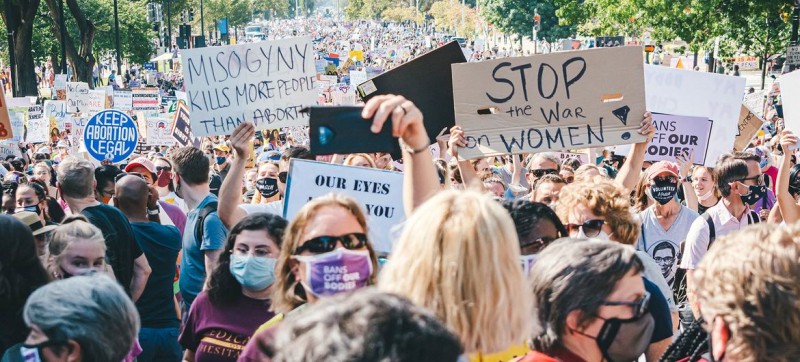Abortion rights supporters march in Washington, D.C. in October 2021. Friday’s decision by the US Supreme Court which overturns the 50-year-old Roe v Wade judgement guaranteeing abortion across the United States, was described by the UN human rights chief as “a huge blow to women’s human rights and gender equality.” The widely anticipated Supreme Court decision, by six votes to three, was made in the specific case of Dobbs v Jackson Women’s Health, and Michelle Bachelet said in a statement that it represents a “major setback” for sexual and reproductive health across the US. The historic decision returns all questions of legality and access to abortion, to the individual states. Reacting earlier to the US ruling, without making specific reference to it, the UN sexual and reproductive health agency (UNFPA) and the World Health Organization (WHO) noted that a staggering 45 per cent of all abortions around the world, are unsafe, making the procedure a leading cause of maternal death. The agencies said it was inevitable that more women will die, as restrictions by national or regional governments increase. “Whether abortion is legal or not, it happens all too often. Data show that restricting access to abortion does not prevent people from seeking abortion, it simply makes it more deadly”, UNFPA highlighted. According to the agencies’ 2022 State of World Population report, nearly half of all pregnancies worldwide are unintended, and over 60 per cent of these may end in abortion. UNFPA said that it feared that more unsafe abortions will occur around the world if access becomes more restricted. “Decisions reversing progress gained have a wider impact on the rights and choices of women and adolescents everywhere”, the agency emphasized. WHO echoed the message on their official Twitter account, reminding that removing barriers to abortion “protects women’s lives, health and human rights”. The 1994 Programme of Action of the International Conference on Population and Development (ICPD), signed by 179 countries including the United States, recognized how deadly unsafe abortions are, and urged all countries to provide post-abortion care to save lives, irrespective of the legal status of abortion. The document – resulting from a high-level meeting in Cairo, Egypt—also highlighted that all people should be able to access quality information about their reproductive health and contraceptives. UNFPA, as the custodian of the Programme of Action, advocates for the right of all couples and individuals to decide freely and responsibly the number, spacing and timing of their children and to have the information and means to do so. The agency also warned that if unsafe abortions continue, Sustainable Development Goal 3, related to maternal health, to which all UN Member States have committed, will be at risk of not being met.Restrictions, ineffective
Countries’ responsibilities
The World Organization for Development has been endowed with consultative status with the UN ECOSOC since 2014. The World Organization for Development, which has consultative status wich the UN ECOSOC, develops and implements Global Initiatives to achieve the UN Sustainable Development Goals.




Comments are closed, but trackbacks and pingbacks are open.